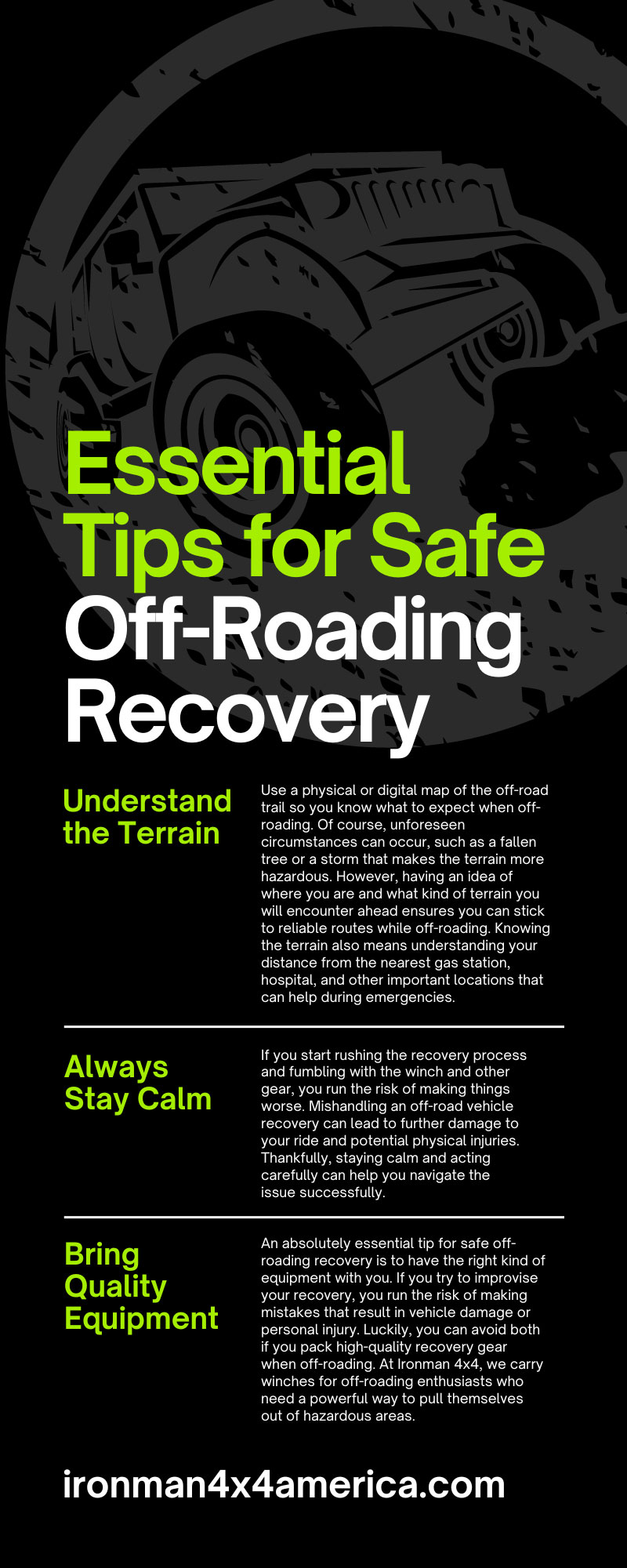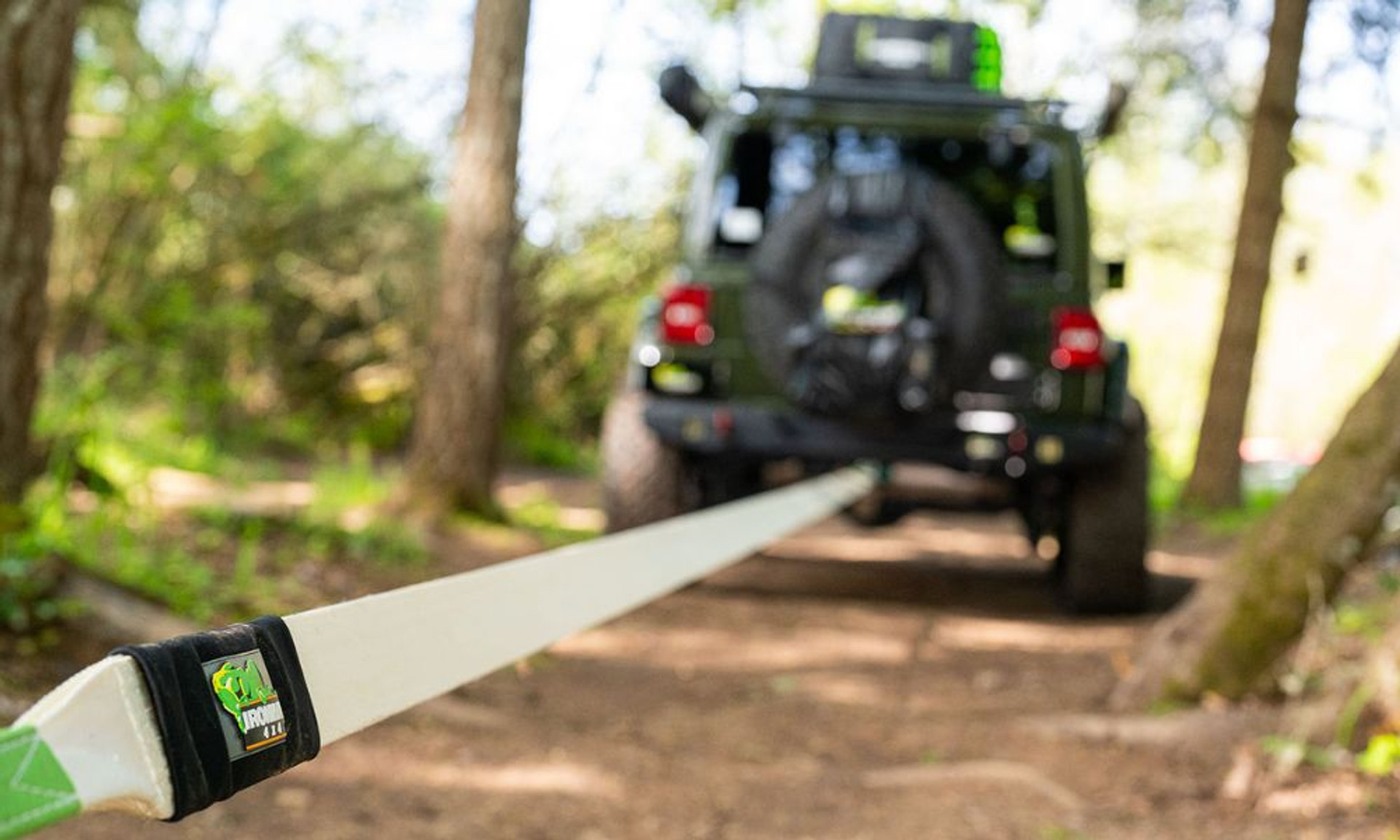6 Essential Tips for Safe Off-Roading Recovery
Off-roading is a fun but hazardous activity, so preparing for accidents is a must. From the soft mud to the rocky landscape, many hazards can make off-roading more challenging. Luckily, ample recovery equipment and techniques are available to use in tricky situations. Although recovering an off-road vehicle can be dangerous, learning how to do so accurately will ensure you can quickly get back to driving. Use our essential tips for safe off-roading recovery to get yourself out of trouble without making things worse.
Understand the Terrain
Before we address how to get unstuck when off-roading, let’s address how to avoid getting stuck in the first place. Use a physical or digital map of the off-road trail so you know what to expect when off-roading. Of course, unforeseen circumstances can occur, such as a fallen tree or a storm that makes the terrain more hazardous. However, having an idea of where you are and what kind of terrain you will encounter ahead ensures you can stick to reliable routes while off-roading. Knowing the terrain also means understanding your distance from the nearest gas station, hospital, and other important locations that can help during emergencies.
Make sure you have a charged phone with you so you can call for help whenever necessary. Driving with a partner is always helpful, but some accidents may require a call to friends or even emergency services. Preparing will reduce your chances of getting stuck while off-roading, but that doesn’t mean you should avoid learning how to recover yourself. Below are the best tips for getting out of a tricky off-roading situation.
Always Stay Calm
Finding yourself in a situation where you need to recover a vehicle is stressful, but staying calm is paramount. If you start rushing the recovery process and fumbling with the winch and other gear, you run the risk of making things worse. Mishandling an off-road vehicle recovery can lead to further damage to your ride and potential physical injuries. Thankfully, staying calm and acting carefully can help you navigate the issue successfully.
Sometimes, your truck may get stuck in the mud, but some accidents can lead to vehicles hanging over ledges or tumbling over. In such situations, act responsibly so you can get everyone out safely. Accidents like these can be scary, so staying focused is key. Don’t try to force your 4x4 through obstacles when you’re truly stuck. Once you realize you’re stuck, you can calmly start the recovery process. Take time before off-roading to learn how to use all your recovery gear accurately and carefully when the need arises. Speaking of which, let’s take a closer look at the hardware you should have with you for a safe recovery.
Bring Quality Equipment
An absolutely essential tip for safe off-roading recovery is to have the right kind of equipment with you. If you try to improvise your recovery, you run the risk of making mistakes that result in vehicle damage or personal injury. Luckily, you can avoid both if you pack high-quality recovery gear when off-roading. At Ironman 4x4, we carry winches for off-roading enthusiasts who need a powerful way to pull themselves out of hazardous areas.
We also carry recovery boards if you need a way to wedge your wheels out of the sand. Sometimes, the softness of sand makes it easier for tires to sink. A recovery board goes underneath the tires to improve traction so you can carefully and effectively get the 4x4 out of the sand.
Don’t worry; you shouldn’t ever have to dig your tires out by hand, especially if you have the right supplies. Shovels are incredibly handy for literally digging yourself out of trouble. The shovels available in our recovery kits at Ironman 4x4 make it easier to use the recovery boards to regain control of your vehicle and direct it back to safety.
Pack Tire Repair Kits
The right off-roading equipment goes beyond supplies that will pull you out of trouble. Using the wrong tires, neglecting maintenance, or hitting a dangerous patch in the terrain can cause tires to fail while off-roading. Therefore, packing a tire repair kit is one of the most important steps in ensuring a safe recovery process. Without functional tires, directing your vehicle through mud, sand, and other terrain is even more challenging.
Among the off-road recovery gear that we have for sale at Ironman 4x4 is the AirPlugger, and you can find a design specifically for your needs. Not every puncture to your off-roading tires is devastating. An AirPlugger provides an easy way for off-roading enthusiasts to patch up punctures so they can get back to driving instead of trying to replace the whole tire. We also carry air compressors for off-roading. These compressors give you a convenient way to refill your tires if the puncture causes too much air loss. That said, you can also purposefully air down your tires with a compressor for better traction off-road, so it’s a versatile tool on any trip.
Replace Worn Gear
Having recovery gear and off-roading vehicle upgrades is nice, but not if they stop working. Always check your off-roading vehicle and recovery supplies before each trip to ensure they’re in great condition. That way, you can avoid bringing a winch, shovel, and other tools that fail the moment you try to recover a vehicle with them.
Even a damaged or low-quality bumper can hinder the recovery process. At Ironman 4x4, we have robust front bumpers that provide you with a strong anchor point to install your winch. Having a high-quality winch and bumper by your side means you can easily get your vehicle unstuck. Replace worn recovery gear and vehicle parts whenever necessary so you can hit the trails with more peace of mind.
Bring a Friend
Having a friend with you helps in a recovery situation, whether they are in your truck or their own off-roading vehicle. They can be your spotter if you are navigating tough inclines and other hazardous areas. Plus, off-roading with a buddy means you have an extra set of hands when you need help digging your tires out of the ground. Having a friend with you also means that you travel with someone who can help you or call for assistance if you injure yourself. Following this and the other tips above will make your next off-road trip safer, especially when accidents strike.


